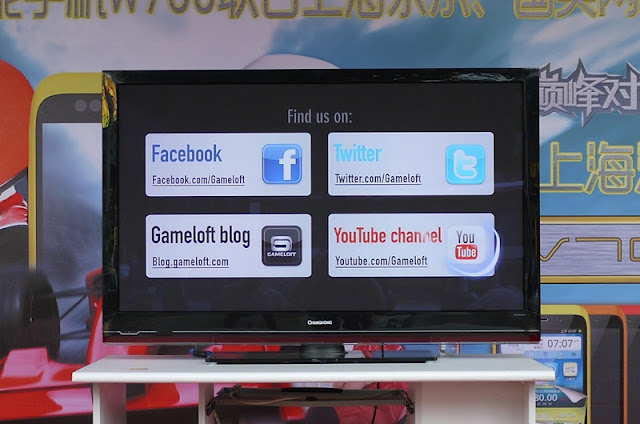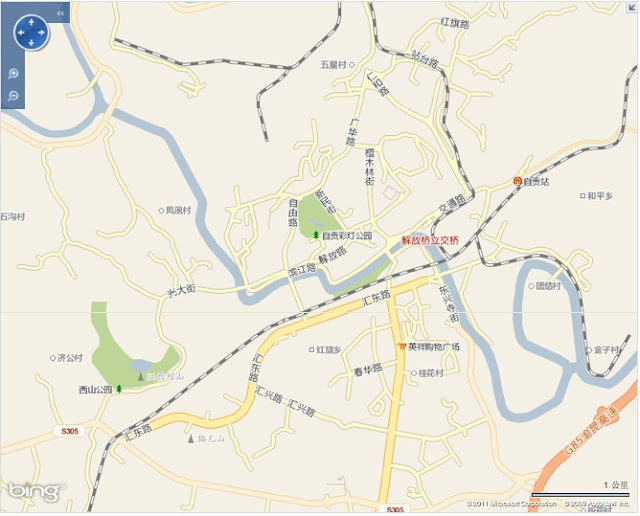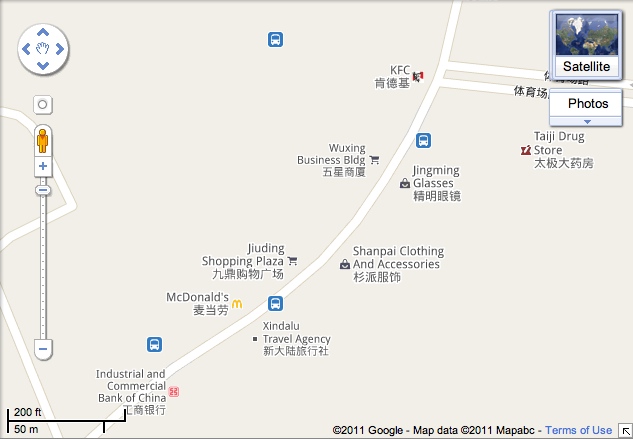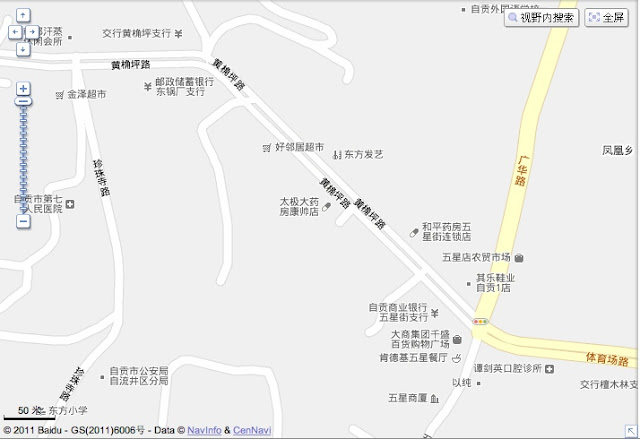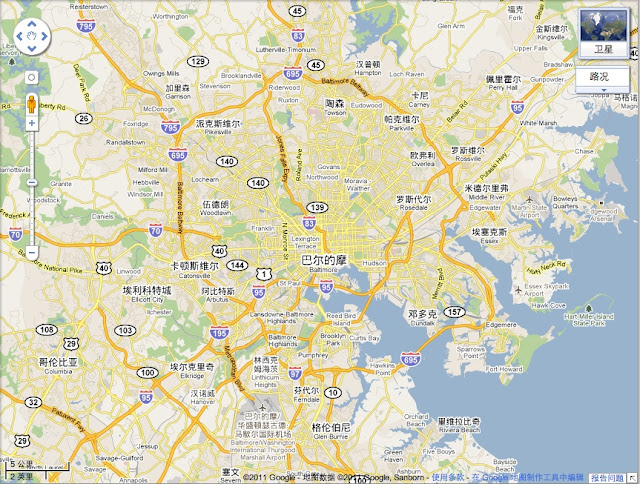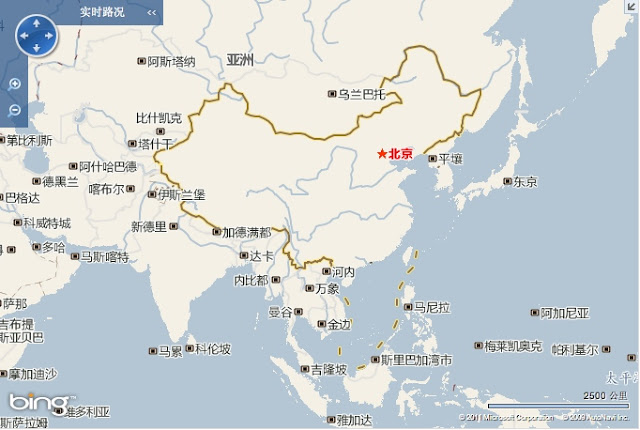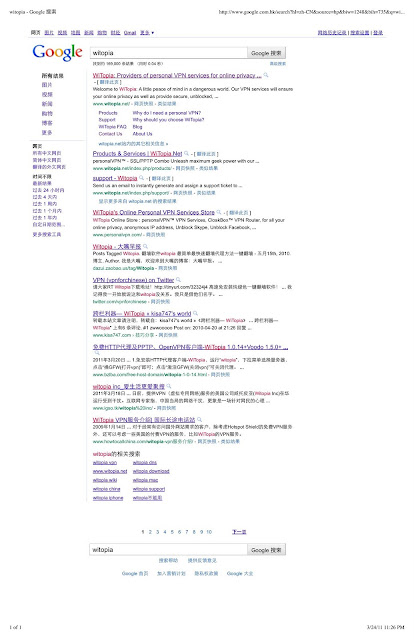As I mentioned in the previous post, this past weekend I was in Shanghai's Qibao Town, best known for its "Ancient Town". As part of another experience I had in a non-ancient section of Qibao, I became familiar with the promotion for a new mobile phone including a new mobile operating system, both developed by Chinese companies.
This building in Qibao includes the electronics store Yolo (永乐 - Yongle):
As part of of a promotion outside the store, a video of scenes from Gameloft's game Asphalt 6: Adrenaline was displayed on a TV:
The promotion wasn't primarily for the game, but for K-Touch's recently released W700 phone on which the game could be played. K-Touch is a Chinese mobile phone brand that I've seen for sale in many cities across China, and I mentioned it in an earlier post about the mobile phone selection at stores in Zhaotong, Yunnan.
K-Touch's W700 is particularly notable for running Alibaba's new Aliyun (阿里云) mobile operating system. Alibaba is a significant force in China, particularly in the e-commerce domain and the Alibaba Group includes web sites such as Taobao (the "eBay of China") and China Yahoo!.
Alibaba intends for Aliyun OS to compete with Google’s Android and Apple’s iOS in China. As noted by Mark Hachman in PC Mag:
I went inside Yolo to try out the phone. I wasn't able to spend much time with it and mostly focused on the Asphalt 6 game given the staff's eagerness to show it off. The short story is that I could only steer the car by pressing on the sides of the screen screen. Tilting the phone to drive the car did not work. The staff insisted that the phone's settings must have been changed because tilting the phone worked fine when they had played the game earlier in the day. They didn't offer to try to change the settings, though.
That Asphalt 6 could be played at all on the K-Touch W700 is interesting since Gameloft does not list the W700 or Aliyun OS as compatible for the game (nor does Gameloft have a Chinese web site). However, there is a key feature of Aliyun OS that may explain how the game can be played.
One line of the flyer seen above advertises "兼容多种Android应用". That translates as "Compatible with a variety of Android applications". I'm not familiar with how Aliyun OS is able to run Android applications without itself being or including a version of Android in some manner. But this relationship of operating systems isn't entirely unique in at least some regards. For example, it's possible to run Windows on Apple's Mac OS X.
The promotion highlighted the Android connection elsewhere as well. For example, you may have already noticed than in the photo of the TV above the words "Available Now On Android" appear on the screen.
The Android logo also appeared in the display case as seen here:
There are pictures of cubes representing Youku (the "YouTube of China"), Windows Live Messenger, Kaixin (a social networking service), Taobao, QQ (instant messaging & more), and... Android amongst others.
While I could appreciate the desire to highlight that the W700 could run Android applications, I found it curious that K-Touch would build a whole promotion around an application that was built for Android versus focusing on the uniqueness of the Aliyun OS offerings. I also noticed that "Asphalt 6" or a Chinese equivalent was not written on any of the promotional material I saw that day other than in the video and the game itself -- even though there is ample reference to the racing theme.
At the time I wasn't sure whether to read anything into this. However, I now see that the game appears to be be specifically referenced in connection with the W700 on the K-Touch web site as seen in the mention of "狂野飙车6" in an announcement of a game competition which is being held by K-Touch in 20 cities across China including Shanghai (screen capture of part of the page below).
And a sales page on Taobao linked to from the home page of the K-Touch web site specifically says that the game is included on the phone and that K-Touch has an agreement with Gameloft to do so.
Whatever agreements K-Touch may have with Gameloft, it isn't the only mobile phone brand tying Asphalt 6: Adrenaline to its product in China. In Qibao and elsewhere in Shanghai I've seen the following advertisement in metro stations:
Since this Sony Ericsson mobile phone runs the Android operating system, I suspect their marketing challenges are a bit more straight forward.
Regardless, what most captured my attention about the K-Touch promotion was the final scene for the video on display:
Yes, the video included directions for where to find Gameloft on Facebook, Twitter, and YouTube.
Maybe it's just me, but it seems a bit peculiar for K-Touch to be promoting web sites that are blocked by China's Great Firewall. I asked the salespeople about why these web sites were included in the video. After some discussion they decided they had no idea and looked hopeful I would stop asking about it.
Later, I discovered one possible source for the video: YouTube.
As far as I recall, the YouTube video above is the same video I saw outside the Yolo. And for what it's worth I couldn't find it on Youku. The video was posted by Gameloft and is specific for its Android release (there is another video for its iPhone release).
Anyways, it will be interesting to see how the W700 does in China. But even if it performs poorly, K-Touch can perhaps still tie in Asphalt 6 to its products. After all, some of K-Touch's other phones, such as the U2 and W606, don't use the Aliyun OS, but they do use Android.
They may want to drop references to blocked web sites, though.
This building in Qibao includes the electronics store Yolo (永乐 - Yongle):
As part of of a promotion outside the store, a video of scenes from Gameloft's game Asphalt 6: Adrenaline was displayed on a TV:
The promotion wasn't primarily for the game, but for K-Touch's recently released W700 phone on which the game could be played. K-Touch is a Chinese mobile phone brand that I've seen for sale in many cities across China, and I mentioned it in an earlier post about the mobile phone selection at stores in Zhaotong, Yunnan.
K-Touch's W700 is particularly notable for running Alibaba's new Aliyun (阿里云) mobile operating system. Alibaba is a significant force in China, particularly in the e-commerce domain and the Alibaba Group includes web sites such as Taobao (the "eBay of China") and China Yahoo!.
Alibaba intends for Aliyun OS to compete with Google’s Android and Apple’s iOS in China. As noted by Mark Hachman in PC Mag:
Alibaba's operating system makes use of "cloud-based" services, including e-mail, Internet search, weather updates and GPS and mapping applications, the company said. The OS will apparently require users to be constantly connected to take advantage of its Web-based apps, instead of designing applications that can run natively on the phone's hardware...
"Mobile users want a more open and convenient mobile OS, one that allows them to truly enjoy all that the Internet has to offer right in the palm of their hand, and the cloud OS, with its use of cloud-based applications, will provide that," said Wang Jian, president of Alibaba Cloud Computing, in a statement. "Introducing cloud apps to mobile devices not only brings a whole new user experience, but also greater ease for third-party mobile software developers who will be able to use Internet technology such as HTML5 and JavaScript to reduce the complexity in the app development process."
Alibaba said that each user would be given a free 100 Gbytes of storage to back up data to AliCloud's remote data center, which could be replicated to the PC and mobile devices.
I went inside Yolo to try out the phone. I wasn't able to spend much time with it and mostly focused on the Asphalt 6 game given the staff's eagerness to show it off. The short story is that I could only steer the car by pressing on the sides of the screen screen. Tilting the phone to drive the car did not work. The staff insisted that the phone's settings must have been changed because tilting the phone worked fine when they had played the game earlier in the day. They didn't offer to try to change the settings, though.
That Asphalt 6 could be played at all on the K-Touch W700 is interesting since Gameloft does not list the W700 or Aliyun OS as compatible for the game (nor does Gameloft have a Chinese web site). However, there is a key feature of Aliyun OS that may explain how the game can be played.
One line of the flyer seen above advertises "兼容多种Android应用". That translates as "Compatible with a variety of Android applications". I'm not familiar with how Aliyun OS is able to run Android applications without itself being or including a version of Android in some manner. But this relationship of operating systems isn't entirely unique in at least some regards. For example, it's possible to run Windows on Apple's Mac OS X.
The promotion highlighted the Android connection elsewhere as well. For example, you may have already noticed than in the photo of the TV above the words "Available Now On Android" appear on the screen.
The Android logo also appeared in the display case as seen here:
There are pictures of cubes representing Youku (the "YouTube of China"), Windows Live Messenger, Kaixin (a social networking service), Taobao, QQ (instant messaging & more), and... Android amongst others.
While I could appreciate the desire to highlight that the W700 could run Android applications, I found it curious that K-Touch would build a whole promotion around an application that was built for Android versus focusing on the uniqueness of the Aliyun OS offerings. I also noticed that "Asphalt 6" or a Chinese equivalent was not written on any of the promotional material I saw that day other than in the video and the game itself -- even though there is ample reference to the racing theme.
At the time I wasn't sure whether to read anything into this. However, I now see that the game appears to be be specifically referenced in connection with the W700 on the K-Touch web site as seen in the mention of "狂野飙车6" in an announcement of a game competition which is being held by K-Touch in 20 cities across China including Shanghai (screen capture of part of the page below).
And a sales page on Taobao linked to from the home page of the K-Touch web site specifically says that the game is included on the phone and that K-Touch has an agreement with Gameloft to do so.
 |
| No problem here. K-touch has an agreement with Gameloft. |
Whatever agreements K-Touch may have with Gameloft, it isn't the only mobile phone brand tying Asphalt 6: Adrenaline to its product in China. In Qibao and elsewhere in Shanghai I've seen the following advertisement in metro stations:
Since this Sony Ericsson mobile phone runs the Android operating system, I suspect their marketing challenges are a bit more straight forward.
Regardless, what most captured my attention about the K-Touch promotion was the final scene for the video on display:
Yes, the video included directions for where to find Gameloft on Facebook, Twitter, and YouTube.
Maybe it's just me, but it seems a bit peculiar for K-Touch to be promoting web sites that are blocked by China's Great Firewall. I asked the salespeople about why these web sites were included in the video. After some discussion they decided they had no idea and looked hopeful I would stop asking about it.
Later, I discovered one possible source for the video: YouTube.
As far as I recall, the YouTube video above is the same video I saw outside the Yolo. And for what it's worth I couldn't find it on Youku. The video was posted by Gameloft and is specific for its Android release (there is another video for its iPhone release).
Anyways, it will be interesting to see how the W700 does in China. But even if it performs poorly, K-Touch can perhaps still tie in Asphalt 6 to its products. After all, some of K-Touch's other phones, such as the U2 and W606, don't use the Aliyun OS, but they do use Android.
They may want to drop references to blocked web sites, though.







